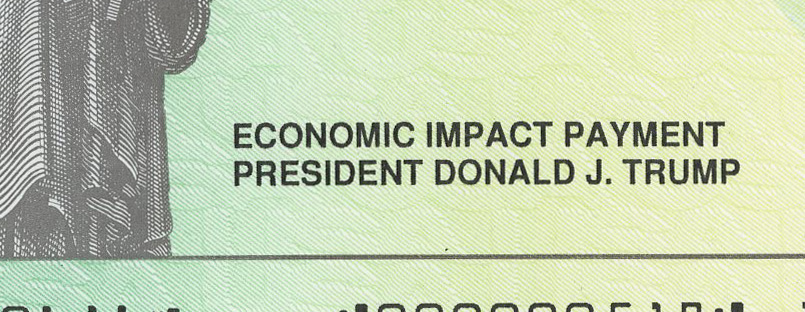
ECONOMIC
RELIEF:
"VERY
EXPENSIVE
BAND-AIDS"1
ema updated 05/15/20 - The coronavirus pandemic is imposing a toll on the U.S. economy as great or greater than the Great Depression, and it will take years to recover. A Bureau of Economic Analysis advance estimate released April 29 found that, "Real gross domestic product (GDP) decreased at an annual rate of 4.8 percent in the first quarter of 2020."2 The Labor Department's May 14 unemployment report on initial claims for unemployment brings the total number of people who have filed initial claims for unemployment since the pandemic hit to 36 milllion.3 An economist with the Federal Reserve Bank of St. Louis estimated in March that through the 2nd Quarter of 2020, 47.05 million people could be laid off for an unemployment rate of 32.1%.3 State and local governments have taken a huge hit.
To address the crisis Congress has passed four pieces of legislation.
The first two were quickly agreed to. President Trump signed H.R.6074, Coronavirus Preparedness and Response Supplemental Appropriations Act, into law on March 6 and H.R.6201, Families First Coronavirus Response Act, into law on March 18.
The most significant piece of coronavirus legislation was H.Res.748, the Coronavirus Aid, Relief, and Economic Security (CARES) Act, described as "the largest rescue package in American history," which President Trump signed into law on March 27, 2020. The bill has a price tag of around $2 trillion.
H.R.266, the Paycheck Protection Program and Health Care Enhancement Act, is a $484 billion interim relief package which includes $320 billion for the Paycheck Protection Program, a provision of the CARES Act that was quickly exhausted. President Trump signed H.R. 266 into law on April 24.
The path forward for the next piece of coronavirus legislation is unclear. On May 15 the House passed H.R.6800, the Democrat backed Health and Economic Recovery Omnibus Emergency Solutions (HEROES) Act, a $3 trillion piece of legislation that faces strong Republican opposition and is unlikely to ever be signed into law.
The New York Times notes that congressional action has been essentially reactive, "placing an array of expensive bandages on a gaping wound."4 The Committee for a Responsible Budget, while acknowledging the importance of federal investments to ward off a possible depression, notes that "debt and deficits will now grow much higher, to never-before-seen levels both in dollars and as a share of Gross Domestic Product (GDP)." Meanwhile progressive groups are making the argument that economic relief in itself is not sufficient, and that this is the time to make transformative changes to the economy (+).
Legislation Passed
H.R.6074 - Coronavirus Preparedness and Response Supplemental Appropriations Act, 2020 (President Trump signed into law on March 6) ...CBO Cost Estimate
H.R.6201 - Families First Coronavirus Response Act (President Trump signed into law on March 18) ...CBO Cost Estimate
H.R.748 - Coronavirus Aid, Relief, and Economic Security (CARES) Act (President Trump signed into law on March 27) ...CBO Cost Estimate
H.R.266 - Paycheck Protection Program and Health Care Enhancement Act (President Trump signed into law on April 24)
Notes:
1. Jim Tankersley and Emily Cochrane. "Congress Shovels Trillions at Virus, With No Endgame in Sight." New York Times, April 24, 2020.
2. Press Release. "Gross Domestic Product, 1st Quarter 2020 (Advance Estimate)." Bureau of Economic Analysis, U.S. Department of Labor, April 29, 2020.
3. Press Release. "Unemployment Insurance Weekly Claims." U.S. Department of Labor, May 14, 2020.
4. Miguel Faria-e-Castro. "Back-of-the-Envelope Estimate's of Next Quarter's Unemployment Rate." Federal Reserve Bank of St. Louis, March 24, 2020.
See also:
Committee for a Responsible Budget.
"Paycheck Protection Program." Small Business Administration.
Preview YouTube video Connie: "I want someone who's honest

